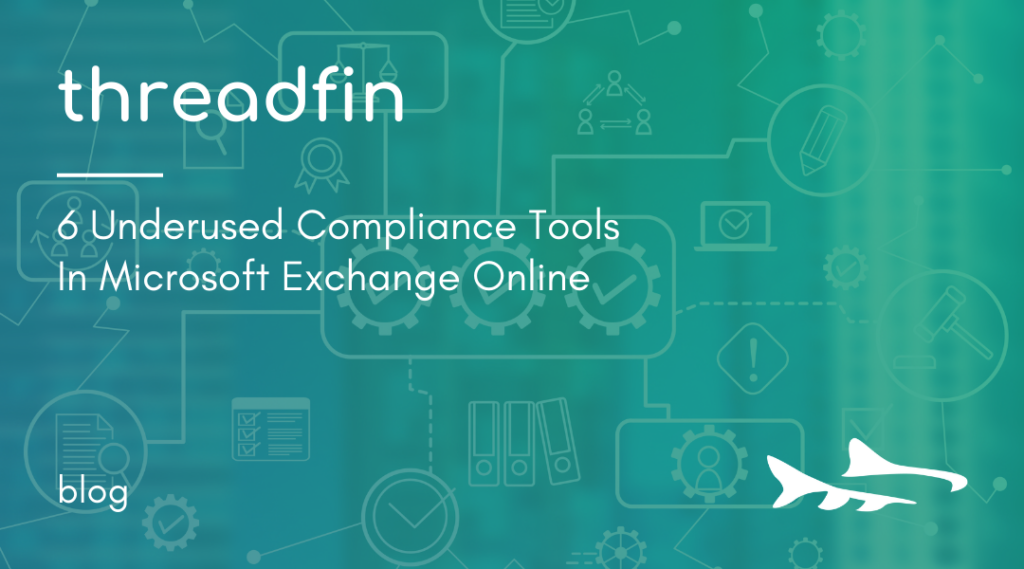Introduction
In today’s digital era, organizations face an increasing number of regulatory requirements and data protection challenges. Failure to comply with these regulations can lead to severe consequences, including financial penalties and damage to reputation. While Microsoft Exchange Online advanced compliance tools that can help organizations mitigate these risks, we find that many organizations aren’t fully leveraging them to their advantage:
- Data Loss Prevention (DLP)
- eDiscovery and Legal Hold
- Retention Policies
- Audit Logging and Reporting
- Encryption
- Information Rights Management (IRM)
In this article, we’ll delve into each of these Microsoft Exchange Online advanced compliance tools and highlight the key features that empower organizations to protect their data and comply with regulatory requirements effectively. Before we talk about specific tools, let’s take a look at the types of organizations that benefit from their use.
While the classic examples of regulated entities are listed below, the need for advanced compliance tools extends to any organization that handles sensitive data and must adhere to regulatory requirements.
- Enterprises and large corporations: Large organizations often deal with vast amounts of sensitive data and must comply with complex regulatory frameworks.
- Healthcare and medical institutions: Healthcare organizations handle highly sensitive patient information and must comply with strict regulations like HIPAA.
- Financial institutions: Banks, insurance companies and other financial institutions handle confidential customer information and must adhere to stringent data protection regulations, like GDPR and PCI DSS.
- Legal firms: Law firms deal with sensitive client data and are often involved in legal proceedings that require eDiscovery capabilities.
- Government and public sector organizations: Government agencies and public sector entities handle sensitive citizen data and are subject to strict compliance regulations.
- Education institutions: Educational institutions store student and staff information that needs to be protected.
At Threadfin, we believe that all organizations will benefit from implementing Microsoft Exchange Online’s advanced compliance features. Let’s take a look at each one.
Data Loss Prevention (DLP)
Microsoft Exchange Online’s DLP capabilities enable organizations to identify, monitor and protect sensitive information from being accidentally or maliciously leaked. By defining policies, organizations can automatically detect and prevent the unauthorized sharing of sensitive data through email communications. Leveraging DLP helps organizations maintain control over their data and ensures compliance with industry-specific regulations such as GDPR or HIPAA.
eDiscovery and Legal Hold
In the event of legal or regulatory investigations, organizations need to be able to quickly search and retrieve relevant emails and documents. Microsoft Exchange Online’s eDiscovery and Legal Hold tools simplify this process by providing powerful search capabilities and allowing organizations to place legal holds on specific data to prevent its deletion. This functionality streamlines the eDiscovery process, saving time and effort while ensuring compliance with legal obligations.
Retention Policies
Retaining data for specific periods is often a legal requirement for organizations. Microsoft Exchange Online’s Retention Policies feature allows organizations to define policies for preserving data based on regulatory or business needs. Whether it’s retaining emails for a specified duration or permanently deleting outdated data, these policies help organizations stay compliant while efficiently managing their data.
Audit Logging and Reporting
To meet regulatory requirements, organizations must have robust audit trails and comprehensive reporting capabilities. Microsoft Exchange Online offers extensive audit logging and reporting features, enabling organizations to track and monitor user activity, detect security incidents, and generate detailed reports. These tools enhance transparency and accountability, helping organizations demonstrate compliance during audits or investigations.
Encryption
Securing sensitive information during transit is paramount for compliance and data protection. Microsoft Exchange Online’s encryption capabilities ensure that emails and attachments are encrypted when transmitted between recipients. This safeguards data against unauthorized access or interception, reducing the risk of data breaches and ensuring compliance with data protection regulations.
Information Rights Management (IRM)
Organizations often need to control and restrict access to sensitive data even after it leaves their environment. Microsoft Exchange Online’s Information Rights Management (IRM) allows organizations to apply persistent protection to emails and documents, controlling who can access, forward, print, or copy the content. This granular level of control helps organizations maintain data integrity and comply with confidentiality requirements.
Conclusion
By proactively embracing these tools, organizations can not only protect themselves from legal and financial risks but also foster trust with their customers and stakeholders, demonstrating a commitment to data privacy and security. Threadfin can provide guidance, assist in configuring the features according to your organization’s specific needs, and offer ongoing monitoring and management to ensure optimal compliance.
Instead of navigating this alone, consider reaching out to a knowledgeable partner like Threadfin. Our expertise ensures your migration strategy is comprehensive and capitalizes on these advanced compliance tools.

